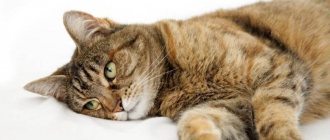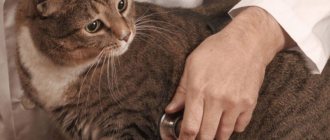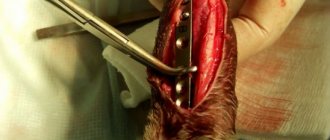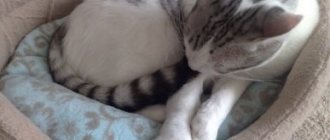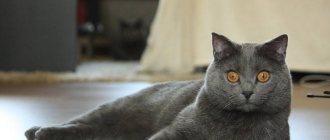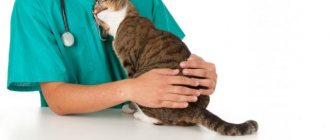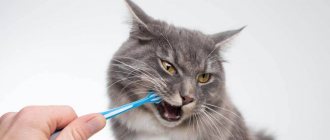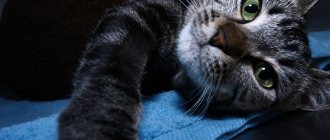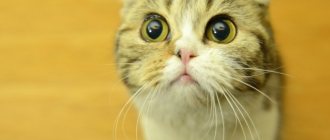The heart is one of the main organs in both humans and animals. The health and life expectancy of our pets depends on its work. The slightest disruptions in the cardiac system can lead to serious consequences. One of these problems can be a heart attack in a cat. The Murkoshi team recommends calling a veterinarian immediately if symptoms of this disease appear.
1) What is a heart attack? 2) Causes of the disease 3) Risk factors 4) Symptoms of an attack 5) First aid and treatment 6) Prevention
Do cats have heart attacks? The answer is yes!
Heart attack is not a veterinary term, but a complaint from pet owners!
A heart attack in cats is a manifestation of heart failure syndrome. This problem is associated with genetically determined heart disease in cats. Heart disease occurs in all breeds of cats, but most often in representatives of risk group breeds (British, Scottish, Sphynx, Persian, Maine Coon).
The article discusses the main causes, symptoms, treatment and first aid for a heart attack in cats. What are the main symptoms, causes, treatment and first aid for a heart attack in cats?
Diseases of the heart muscle in cats are hidden for a long time, but appear suddenly after stress, especially after castration and sterilization of apparently healthy animals. Therefore, it is recommended that cats be screened by a cardiologist before undergoing planned interventions.
Prevention
The main enemies of a cat’s heart are poor nutrition and a sedentary lifestyle. The right diet can slow down the progression of the disease, and in some cases even cure the underlying disease. To prevent heart failure in a cat, you need to monitor the proper nutrition of your tailed friend. Cats that lead a “sofa” lifestyle should be encouraged to be stirred up. The easiest and most effective way to do this is through games. The rich experience of Murkoshi volunteers suggests that it is enough to play 2-3 times a day for 15-20 minutes to provide your cat with a sufficient level of activity. At the shelter, volunteers and staff play with the cats every day, so they feel cheerful and confident even in a confined space.
Read more about the benefits of games: Why do cats play and how to do it correctly with them?
Additionally, some cats may have a genetic predisposition. Therefore, as soon as you get a pet, it is advisable to have a diagnostic test for heart disease. Consultation and observation by a specialist will reduce the risk of disease in cats. Monitor your kitten's health, follow a diet, including specialized food for cats with heart disease, see specialists, and in return receive the love and affection of your mustachioed friend, who will not be afraid of any heart attacks.
Causes of heart attack in cats
Cause of heart attack
- genetic changes in the structure and function of the myocardium, that is, various gene mutations. Most pathological genes for damage to heart cells in cats are in a “dormant” state, can be activated during the growth of animals, or can remain in a “dormant” state until the end of the animal’s life.
Cardiomyopathies are the immediate cause of heart attacks in cats.
The following cardiomyopathies are known in cats:
- Hypertrophic - hypertrophy of the walls of the left and sometimes right ventricle.
- Restrictive - fibrous degeneration of the myocardium, thickening of the heart muscle, with normal thickness of the walls of the heart.
- Right ventricular dysplasia of the right ventricle is a fibrofatty degeneration of the wall of the right ventricle.
- Dilated - a sharp decrease in the contractility of the left ventricular myocardium and expansion of its cavity with normal or reduced wall thickness.
- Stress-induced - reversible cardiopathy, which occurs after stress factors, is manifested by temporary thickening of the walls of the heart. This pathology is completely cured within 1-2 months if the symptoms of congestive heart failure are controlled.
- Secondary cardiomyopathies (for diseases of other internal organs)
- Unclassified cardiomyopathies (transitional forms, unstudied pathologies)
What can cause heart disease in animals
Depending on the origin, myocardial pathologies are divided into 2 large groups:
- Congenital – defects of blood vessels and valves. Problems with the myocardium occur in young pets, often up to a year old - shortness of breath, cyanotic tongue, fainting. Symptoms vary depending on the severity of the disease, ranging from subtle symptoms to death.
- Acquired - heart problems often appear with age, mainly after 7, less often 2-3 years. They can also be the result of injuries, neoplasms, past diseases - viral, bacterial, parasitic, autoimmune.
What are the symptoms of a heart attack in a cat?
- Increased breathing rate during sleep
- Increased breathing rate at rest
- Hard breath
- Decreased appetite
- Pale and cyanotic tongue
- Forced pose
- Excitation
- Decreased body temperature
- Weakness - exercise increases symptoms
Increased breathing rate during sleep and at rest.
Cats with a heart attack pant rapidly. Breathing is difficult, abdominal, sometimes with wheezing. The cat is trying to inhale with greater amplitude. The intercostal spaces and hypochondrium may sink during maximum inspiration. The most valuable symptom in sick cats is an increase in breathing rate during sleep more than 27 times per minute. This means that the animal may have pulmonary edema or fluid accumulation in the chest cavity and require emergency hospitalization.
A less accurate symptom of heart attack in a cat is an increase in resting respiratory rate of more than 30 times per minute.
Stress can affect the breathing rate of a healthy cat. However, if your cat has increased breathing at rest, you should also seek help from a veterinary clinic. Cats with a heart attack may scream and worry, move around and cannot find a place for themselves or a comfortable position.
Hearing loss in a cat due to a heart attack is not a typical symptom. Hearing loss is possible in severe heart failure, when there is insufficient oxygen supply to the brain. Cats very often die from a heart attack.
Caring for a sick animal
In the period after acute symptoms have resolved, your pet should be provided with special care that will help it live several more happy years.
New way of life
The main condition for recovery is complete rest. You can’t tug at your mustachioed friend again or allow him to jump from a height. It is worth limiting visits to public places. While walking, you should not go to parks with large concentrations of other animals that could chase or scare your recovering pet. It is better to refrain from walking altogether for a long time.
Stressful situations should be minimized. Do not allow rapid heartbeat.
The room where the patient lives must be well ventilated. However, it is unacceptable to allow the cat to be in drafts. Your pet should have a dark corner where he can hide from everyone.
What to feed your pet
Much attention in the post-infarction period is paid to nutrition. Now the menu should consist of easily digestible foods: carbohydrate foods, fermented milk products, fatty protein foods are excluded. Porridge can be cooked not only in water, but also in low-fat chicken broth.
Be sure to exclude lard, fish, smoked, fried and salted foods from the diet. You should not give your recovering friend food from your host’s table. It contains a large amount of seasonings and preservatives, which are bad for your health. But a diet of meat and vegetables is good for your pet.
If your pet is accustomed to eating ready-made industrial food, then you need to pay attention to its composition. They shouldn't be of poor quality. A recovering cat should be switched to premium food or higher, which can be purchased at veterinary pharmacies. In addition to nutrients, they contain elements and vitamins that are beneficial for the cardiovascular system. The names of the foods will be recommended by the treating veterinarian.
First aid for a cat having a heart attack
- It is necessary to take your pet to a veterinary clinic as quickly as possible.
If an animal has a previously diagnosed heart disease and a sudden attack occurs, then you need to inject the cat intramuscularly with 0.5-1.0 ml of furosemide (Lasix) and urgently take the animal to the clinic. - During a heart attack, a cat should not be forcibly placed on its side.
It is advisable to raise the upper part of the animal’s body (so that the head is higher than the limbs).
At the clinic, doctors will use intravenous injections of furosemide. Provide oxygen to the animal's breathing. If necessary, the patient will be given sedatives. It is possible that drugs such as nitroglycerin, dobutamine, and vetmedin will be used.
What should owners do?
The fact of the matter is that it is difficult to recommend specific actions. Often “advice” appears on thematic resources, which, in particular, talks about the need to “inject NoSpa and analgin.” Don't follow them please! Firstly, your cat may not be having a heart attack, since the same signs are quite typical for some poisonings. Secondly, you cannot calculate the dosage by eye, and analgin, for example, is a rather harmful substance.
Thirdly, something similar can occur when a nerve is pinched. Weak home remedies when administered intramuscularly are unlikely to alleviate the cat’s suffering... But the animal, twitching and trying to get rid of its owner’s tenacious hands, has an increased chance of further aggravating its condition, which cannot be called brilliant anyway.
So just call your vet. If the animal’s condition has stabilized (and this often happens), then do not try to put the cat in a carrier and take it to the doctor yourself! This way you will scare a pet that has just calmed down into a stupor, which can be fatal for its heart.
Good to know
- Can cats hide pain?
- Serval cats
- Urinary retention in cats
- Causes of pain syndrome in cats
- Feline Orofacial Pain Syndrome
- Catnip for cats
- How to care for an old cat?
- How to properly dry a cat?
- How to Choose a Kitten for your Home
- Pneumonia of Cats
- Causes of Sneezing in Cats
- Anatomy and physiology of the liver in cats
- The structure and functions of the thyroid gland in cats
- Measuring blood pressure in cats
- Current role of dexmedetomidine in clinical veterinary and medical anesthesia and intensive care
- Thyroid function testing in cats
- Gabapentin in cats and dogs
- Information content of hematological and echocardiographic preoperative screening indicators
- Historical background on hyperthyroidism in cats
- Hyperthyroidism in older cats
- Cardiac hypertrophy in cats
- Analysis of anamnestic data during preoperative examination of animals
- Study of anamnestic data in cats before general anesthesia
- Method for measuring blood pressure in cats
- ICD in cats (diagnosis and symptoms)
- Hyperthyroidism is suspected, but serum T4 concentration is normal
- Acute gastroenterocolitis in dogs (etiology, pathogenesis, diagnosis and treatment)
- Reducing mortality during anesthesia is an important task of veterinary anesthesiology
- Thrombosis in cats (general information, etiology, pathogenesis, clinical picture, diagnosis and treatment)
- Urolithiasis of small animals (etiology, pathogenesis, diagnosis and treatment)
- Congestive cardiomyopathy in cats (What is it? How to protect your pets)
- Gastrointestinal tract in dogs (anatomy and physiology)
Diagnostics
If we talk about the symptoms and treatment of heart failure in cats, then first of all it is worth realizing that only a specialist can accurately determine this pathology. As a rule, in order to understand that animals suffer from this pathology, it is not enough to use a phonendoscope and a thermometer.
More serious research is required. Therefore, it is best to have an experienced veterinarian with extensive experience evaluate the symptoms and treatment of heart failure in cats. In Moscow, St. Petersburg and other large cities, veterinary clinics can offer pet owners a full range of services. Such institutions have all the necessary equipment.
If you suspect that your pet is suffering from this pathology, it is necessary to conduct biochemical blood tests. Based on the results of this diagnosis, it is much easier for a specialist to understand why the animal is suffering from heart failure.
There are also several other methods that can accurately identify the cause of problems. First of all, the animal owner is interviewed. He should describe the pet’s daily life in as much detail as possible and list all the changes that have happened to him recently.
The specialist must listen, palpate the cat and determine visual as well as physiological changes. Many people believe that measuring blood pressure in animals does not bring any results.
However, these indicators also help identify problems with the cardiovascular system. It is better if the clinic has ECG equipment. This diagnostic method is considered one of the most reliable in determining problems with the heart muscle.
An x-ray is also recommended. In the image, the doctor will be able to see exactly how the heart is located and clarify its size. Ultrasounds are also performed for animals. However, it must be taken into account that not every rural doctor is able to correctly read the results of this study.
A preliminary diagnosis is made based on clinical signs. The cat owner should be wary of changes in behavior. The pet avoids communication, does not play, and meows pitifully. The final diagnosis is established by a veterinary cardiologist based on the clinic, as well as the following studies:
- standard urine and blood analysis;
- thoracic radiograph;
- Ultrasound.
- ECG.
Animals with confirmed cardiac failure are excluded from breeding.
Comparison of a healthy and diseased heart It is very important to identify the disease in the initial stages of development. This can be done by an experienced doctor in a well-equipped clinic, since in this case a banal phonendoscope will not do.
It is necessary to carefully collect all the information you know - what infectious and chronic diseases your pet suffers from, how long ago the symptoms of the disease began, the presence of vaccinations and changes in the animal’s behavior.
General examination – will help with preventive examinations. It helps to identify the disease in the absence of external manifestations, based on listening to murmurs, rhythm disturbances and visualizing the cardiac impulse (a sign of myocardial hypertrophy).
It is definitely worth measuring blood pressure to rule out hypertension and identify disorders in one of the blood circulation. With reduced values, dilated heart failure can be suspected.
General blood tests and biochemistry are performed. It is also worth taking blood samples for thyroid hormones to rule out hyperthyroidism. And check for increased sugar levels.
ECG is the main way to detect abnormalities in the heart. Allows you to identify functional changes in the myocardium and the presence of arrhythmias. A more clear picture of heart failure can be seen with an ultrasound scan.
It is also necessary to take an x-ray, on which you can see the expansion of the borders of the heart, its displacement from its normal position, fluid in the heart sac and pleural cavity, as well as ascites.
What is the cause of cardiomyopathy?
In most cases, veterinarians recognize the innate genetic and breed affiliation of cats with HCM. Possible provoking factors include:
- hyperthyroidism, acromegaly;
- hypertension;
- taurine deficiency, unhealthy diet;
- infiltration processes in the heart muscle;
- lymphoma;
- toxins, drugs.
Among cats predisposed to HCM are Maine Coons, Siamese, Britons, Sphynxes and others; they are carriers of the gene that is responsible for the development of cardiomyopathy. The higher the purity of the blood of elite cats, the more likely it is that they will have a lot of diseases of internal organs during examination.
